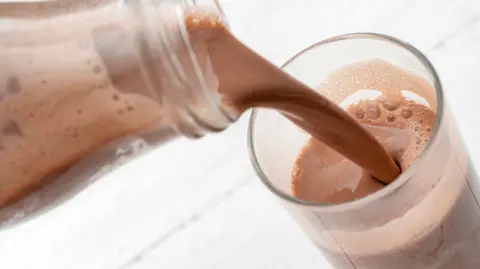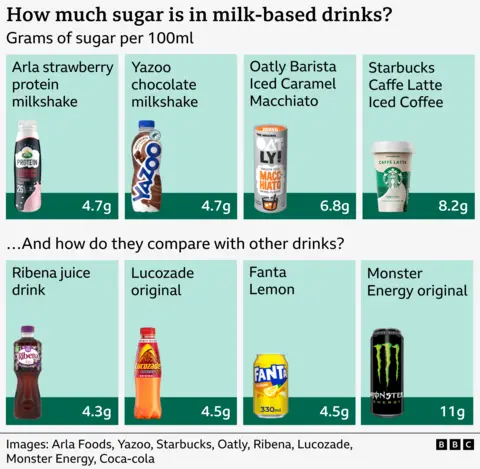Lucy HookerBusiness reporter
 Getty Images
Getty ImagesPrepackaged milkshakes and high-sugar coffee will be subject to an additional tax from 2028 after the Health Secretary announced he was expanding the soda tax to include milk-based products.
Wes Streeting told parliament he was also lowering the threshold at which the tax is charged from 5g to 4.5g of sugar per 100ml in a bid to tackle childhood obesity.
This could mean an additional tax on popular products such as Yazoo, Muller's Frijj and Starbucks Caffe Latte, as well as high protein drinks such as Ufit and Shaken Udder.
The tax, introduced by the Conservative government in 2018, aims to reduce sugar consumption by giving producers an incentive to use less sugar.
The tax applies to products in cans, cardboard boxes and other packaging, but not to drinks sold over-the-counter in cafes and coffee shops.
However, a “lactose supplement” will also be introduced, taking into account the natural sugars in milk.
This means that some sweetness in milk-based drinks will not count towards the total sugar amount when determining their tax liability.
Fruit juices, non-alcoholic beer and wine, and meal replacement drinks are not taxed.
Milk-based drinks were initially exempt from taxes due to their calcium content.
Drinks made from plant milks such as soy, oat and almond milk will also be included in the scope of the tax from 2028 and will be treated similarly to dairy drinks.

The sugary drink tax has been criticized by politicians who see it as excessive government interference in personal consumption choices.
However, the Health Secretary said it would support public health and help reduce pressure on public health services.
“This government will not look away from how children's health is deteriorating,” Streeting said.
“Obesity robs children of the best start in life, hits the poorest people hardest, leaves them with lifelong health problems and costs the NHS billions.”
Judith Bryans, chief executive of industry body Dairy UK, said it was “disappointing” the government's decision to extend the sugar tax given that milk and yoghurt drinks help provide “a range of nutrients” including B vitamins, protein, iodine and calcium.
But she welcomed the inclusion of a lactose (natural sugar found in dairy) standard to address the “unique composition” of dairy products.
“This will ensure that dairy companies do not have to pay a levy on naturally occurring lactose as it is not a public health issue,” she said.
The government's consultation on extending the tax considered lowering the threshold to 4g of sugar per 100ml, but the government said it had considered feedback about the technical issues associated with reformulating products below that level, “as well as the costs and risks of reformulation to businesses.”
A spokesman for the Food and Drink Federation said it was pleased the government had listened to industry concerns.
“The new proposals address the costly and technically complex work that companies must do to bring healthier products to market, and go some way to protecting the investments companies make to help people eat healthier,” they said.
The tax extension may not mean higher retail prices for café au lait and milkshakes if manufacturers absorb the cost of the tax or if they reduce the sugar levels in their products.
Many soda makers have changed their recipes to avoid the tax, although some still sell the higher-sugar version alongside the new one.
The government claims that the original the tax resulted in a 46% reduction in sugar content in carbonated drinks, promoting healthier diets for adults and children as a result of the tax.
Manufacturers are expected to reformulate their products by reducing sugar content or reducing portion sizes in response to the tax changes, the government said.
Any change in prices will also lead to changes in customer behavior, it said.









